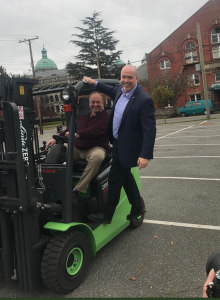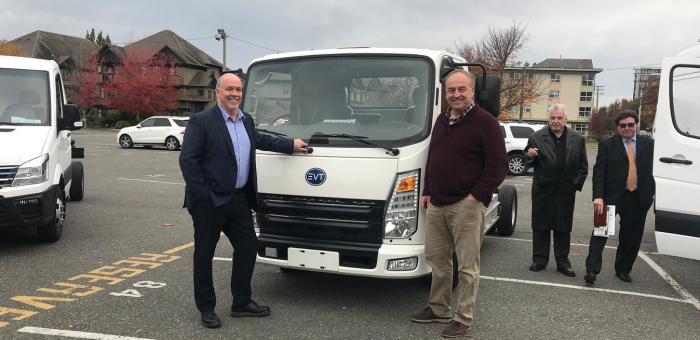To the Premier: What’s being done to expand BC-based EV charging & manufacturing capacity?
Today in the legislature I rose during Question Period to ask the Premier what his government is doing to encourage private investment in electric vehicle charging infrastructure and EV manufacturing in British Columbia.
Below I reproduce the video and text of our exchange.
Video of Exchange
Question
 A. Weaver: We’ve talked about the last 16 years. We’ve talked about the 1990s. Let’s talk about the future now. In the second quarter of 2018, British Columbians bought 2,564 electric vehicles, more than three times the amount bought in the previous year. Across our province, dealerships can’t keep EVs on their lots. Backlogs and waiting lists vary from three months to a year, even up to 18 months, and the clean growth strategy to be released later this fall will bring in an aggressive ZEV standard to B.C.
A. Weaver: We’ve talked about the last 16 years. We’ve talked about the 1990s. Let’s talk about the future now. In the second quarter of 2018, British Columbians bought 2,564 electric vehicles, more than three times the amount bought in the previous year. Across our province, dealerships can’t keep EVs on their lots. Backlogs and waiting lists vary from three months to a year, even up to 18 months, and the clean growth strategy to be released later this fall will bring in an aggressive ZEV standard to B.C.
Charging infrastructure remains a barrier for widespread EV adoption, and B.C. Hydro, which has installed a few fast-chargers recently, has done so by giving away the electricity for free. This has led to large lineups as locals get electricity for free while those who need it and those who want to pay for it have to wait in line, hoping to get a charge at some point down the road.
B.C. manufacturing companies like Electra Meccanica, Envirotech Electric Vehicles and Environex Inc. are looking to set up here in British Columbia — manufacturing facilities that want to grow our economy and meet global demand.
My question is to the Premier. What is his government doing to encourage private investment in electric vehicle charging infrastructure and EV manufacturing in B.C.?
Answer
Hon. J. Horgan: I thank the Leader of the Third Party for the question. It’s nice to have forward-looking questions on how we’re going to build a better, stronger British Columbia, how we’re going to meet our objectives with respect to climate action, and I appreciate the question.
First of all, British Columbia does lead the country in charging stations, some 1,500. And now you can travel from Golden…. The member from Golden can travel all the way to Tofino in his electric vehicle and not have to stop and charge. As the member quite rightly says, though, we do have some challenges.
That’s why the B.C. Utilities Commission has opened up a review on their own initiative to ensure that we find a way to get electricity into electric vehicles in a way that’s cost-effective, a way that’s fair to the travelling public and allows us to build even more capacity going forward.
Lastly, I would say, with respect to electric vehicle uptake in the economy, we had to increase…. The Minister of Finance found an additional $10 million to put into the clean energy vehicle program in September because it was already oversubscribed from February. That speaks to demand in the economy. That speaks to a responsive government that’s listening to people and putting in place programs and services that will help them and help all of us meet our climate change objectives.
Supplementary Question
A. Weaver: As the Premier mentioned, obviously there are nearly 1,500 EV charging stations in British Columbia. Almost all of them give away electricity for free. Some are private; most are not. The free model is rapidly becoming unsustainable as more and more British Columbians move towards EVs.
To sell someone electricity in this province, you must be registered as a public utility unless you get some very-difficult-to-get exemption. Oregon, California, Washington, Ontario, New York and a number of other U.S. states have already exempted EV charging from energy regulation. Resale of electricity is permitted, like a gas station, without prior approval, and prices are set by the market. Of course, safety, consumer protection and other considerations are indeed regulated.
My question, then, to the minister is this. The type of approach that encourages private investment in vehicle-charging infrastructure in British Columbia is exactly the direction we want to go. Will the Premier commit his government to updating B.C.’s regulatory environment for EV charging stations immediately after receiving the recommendations from the B.C. Utilities Commission report he referred to?
Answer
Hon. J. Horgan: Again, I thank the member for his interest and passion on this subject. I also want to say that we are utilizing the B.C. Utilities Commission, unlike the previous government that sidelined this very useful regulatory body. We’re using the B.C. Utilities Commission to determine the best way forward.
The member is quite correct. He’s looked into this diligently. We do have some challenges with respect to giving away energy in some places and overcharging in others. A regulatory framework that meets the needs of the travelling public and allows us to meet our climate objectives over time is the right way forward.
I look forward — as all members, I’m sure, do — to the Utilities Commission reporting back in the fall — or in the next number of weeks, I expect — on their proposals going forward.
But I also want to touch on another component of the question that the member asked and that is how can we incent and attract the development of, the creation of construction and the implementation of a program that has a clean, green, innovative tinge to it. That would be left to the member for Surrey-Whalley, the Minister of Jobs, Training and Technology, who appointed the first innovation commissioner in B.C.’s history so that we can have an economy that works for everybody and looks forward, not backward, like the people on the other side.





One Comment
When will BC set mandatory minimums of EV sales for all the vehicle manufacturers? It is time to put pressure on these companies to move forward. How about setting a date to ban ice vehicles altogether???